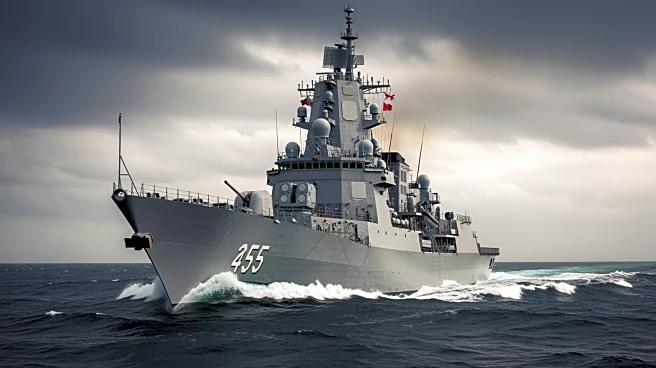What's Happening?
A U.S. Navy destroyer, the USS Gravely, has arrived in Trinidad and Tobago, close to Venezuela's coast, to participate in joint exercises with local defense forces. This deployment has provoked a strong reaction from Venezuela, with Executive Vice President
Delcy Rodríguez condemning the move as a military provocation. The USS Gravely, an Arleigh Burke-class warship, is equipped with guided missiles, helicopters, and U.S. Marines. The arrival of the warship is part of a larger U.S. military buildup in the Caribbean, which includes the aircraft carrier USS Gerald R. Ford and its strike group. The U.S. claims the deployment is aimed at combating illicit trafficking and regional security threats, while Venezuela views it as preparation for potential military intervention.
Why It's Important?
The deployment of the USS Gravely near Venezuela is significant as it underscores escalating tensions between the U.S. and Venezuela. The presence of U.S. military forces in the region is seen by Caracas as a threat to regional stability and a potential precursor to military action against Venezuelan President Nicolás Maduro. This situation is further complicated by Venezuela's alliances with global powers such as Russia, China, and Iran, which could lead to broader geopolitical implications. The U.S. military buildup in the Caribbean represents the largest presence in decades, raising concerns about the possibility of conflict and its impact on regional and global security dynamics.
What's Next?
Venezuela's diplomatic protest against the U.S. military presence has increased scrutiny of the situation, with potential consequences for regional alliances and global power dynamics. The ongoing military buildup near Venezuela's maritime borders could lead to accidental clashes at sea or in nearby airspace, further escalating tensions. Both the U.S. and Venezuela have signaled a readiness to escalate if their strategic objectives are challenged, making the situation precarious. The international community will be closely monitoring developments, as the risk of a serious geopolitical confrontation in the Caribbean remains high.
Beyond the Headlines
The deployment of U.S. military forces near Venezuela raises ethical and legal questions about sovereignty and the use of military power in international relations. The situation highlights the complexities of U.S. foreign policy in Latin America, where historical interventions have often led to long-term consequences. The potential for conflict in the region also underscores the importance of diplomatic efforts to resolve tensions and prevent escalation. The presence of U.S. forces may influence regional politics and could lead to shifts in alliances and power structures in Latin America.















